Quick Links
When monitoring your Google Ads campaigns, you may occasionally see a concerning status next to them that says ‘limited by budget.’
What does this mean?
It simply means that your daily budget is beneath the recommended amount. In other words, the funds you have available won’t be able to match the potential demand for your ads.
As an example, say your daily click budget is $50, with each click costing roughly $1.
Currently, you have enough of a campaign budget to pay for 50 clicks. However, if Google determines there’s enough demand for 100 clicks a day, your ad budget won’t be enough to pay for each click, and you’ll see the ‘limited by budget’ campaign status.
Whenever this happens, Google will have to limit the number of times your ads appear in searches to accommodate your lack of budget. As a result, you may miss out on potential conversions and leads, which is never good.
Yet, just because one of your campaigns is limited by budget doesn’t mean that you can’t work with it.
If increasing your daily budget isn’t a possibility, there are still ways to squeeze the most out of your limited budget while still meeting your advertising goals.
Stay tuned to learn more about Google Ads limited by budget, how to resolve the status, and how to get the most out of your daily ad spend.
Understanding Google Ads Limited By Budget
If your daily click budget dips below the recommended amount, this is what will appear next to your PPC (pay-per-click) campaign in your Google Ads account:
The ‘limited by budget’ status appears in red, which lets you know that you’re likely to run out of funds before the day is out.
That’s Google’s way of telling you that you don’t have the budget to match the demand for ads, which means your ads might not appear during certain times of the day – which may lead to a loss of potential traffic & customers.
The key word there is ‘might,’ as the ‘limited by budget’ status doesn’t guarantee a loss of traffic, it’s just warning you of the possibility.
For instance, let’s say you see the most engagement with your ads when they run during the early morning. Due to the ‘limited by budget’ status, Google may restrict how many of your ads run during the morning, which can negatively affect your advertising goals. However, if they limit your ad visibility during the evening instead, you’ll see less of a negative impact.
The good news is that you can control when Google displays your ads through ad scheduling (more on this in a bit).
Google’s recommendations for your average daily budget
Whenever you receive the limited-by-budget campaign status, there’ll be a small graph icon next to it (see above).
By clicking on this icon, you’ll get to see Google’s recommendations for an ideal daily budget, which looks like this:
You’ll see your current budget, Google’s recommended amount, and a few other options for more weekly clicks & conversions. They also provide metrics for the new budget’s weekly cost, the approximated number of clicks, and the number of conversions you should see each week.
This is a useful tool for determining if you need to change your bid strategy, especially if you’re considerably under budget.
What if you see the ‘limited by budget’ status but aren’t maxing out your funds?
In some cases, you may see the ‘limited by budget’ status for campaigns that aren’t maxing out your budget or generating lots of traffic.
Why is that?
Usually, it’s a sign that your keywords are too expensive for your daily budget or you’re maxing out on the number of clicks you can get in one day.
If your cost-per-click (CPC) is too high for your budget, you may only be able to pay for a few clicks a day.
As an example, imagine that your daily budget is $50, but your average CPC is $25. As a result, you’ll only be able to pay for two clicks a day. In these types of situations, you can use a keyword planner to find more affordable keywords in your niche, or you could raise your daily budget.
How Will Google Ads Limited By Budget Affect Your PPC Campaigns?
While there are ways to work with a limited budget on Google Ads (formerly Google Adwords), there are definitely consequences that will affect your PPC campaigns & advertising goals, including the following:
- You’ll see a reduced impression share. If your campaign is limited by budget, you won’t be eligible for as many impressions as you would have otherwise. That means Google will limit your ad exposure during certain times of the day. Or if you’ve tweaked your targeting settings to run at an accelerated rate, you’ll appear in every auction you’re eligible for until you run out of budget.
- You won’t receive as many clicks. Since you won’t appear in every bid auction, you’re eligible during the day. You’ll miss out on lots of potential clicks, which is never a good thing.
- Reduced conversion rates. Once your budget runs out, your ads will stop appearing throughout the Google Display Network for the day, which means you’ll miss out on converting new prospects.
As you can see, running a PPC campaign on a limited budget has quite a few consequences. While it’s not a guarantee that your campaign will fail to meet your goals, Google Ads limited by budget can stop you from realizing the true potential of your PPC ads.
What Causes the Limited By Budget Status to Appear?
The ‘limited by budget’ status on Google Ads is extremely common, so don’t feel bad if it shows up on one of your campaigns.
There are quite a few reasons why the status may show up, some of which may surprise you – so let’s look at some of the top causes.
Your campaign’s scope is too great
If you’re working with a limited budget, you won’t be able to advertise to the entire planet. Instead, you should narrow your focus to only include the geographic areas that matter the most to your business.
Advertising to the entirety of the United States will consume a lot of your budget, so use location targeting to only display your ads for the geographic areas that give you the most business.
It’s also possible that you’re trying to promote too many products & services, and it’s spreading your budget too thin.
Try pausing some of your ad groups and focusing on one product or service at a time. That way, all your daily resources will go toward promoting a single product/service, which will greatly increase its online visibility.
As an example, if you stretch your $50 daily budget across 5 ad campaigns, each product will only receive a limited amount of promotion per day (10 clicks each if it’s spread evenly). Yet, if you only push one product at a time, it has the potential to claim all 50 clicks, which significantly increases your chances of finding & converting new prospects.
Your bids are too high
It could be that you’ve set your max CPC bids too high. On Google Ads, a bid is how much you’re willing to pay to display one of your ads. As such, ad placements are auctioned off to bidders, with the highest bid winning out and gaining the ad spot.
Setting your max CPC bid is a crucial part of ensuring that your ads yield profits, so it isn’t something you should take lightly.
If your bids are too low, you may save money, but you’ll likely lose a majority of your ad auctions. If your bids are too high, you may win lots of ad placements, but they’ll end up tearing through your daily budget.
If you’re dealing with the ‘limited by budget’ status, you should double-check your max CPC bid to ensure that it’s not too high. Also, you can make bid adjustments that will increase or decrease your bids depending on certain factors, including:
- Time of day
- Geographic locations
- Device type (mobile device or desktop)
- More
Adjusting your bids according to your metrics (i.e., only displaying ads during certain times of the day) will help you avoid wasting your daily budget.
Expensive keywords
Keywords that have high search volume are great to target due to the exposure they can provide, but they’re also more expensive. In the PPC world, the more desirable a keyword is, the more it will eat up your daily budget.
It’s common for Google Ads campaigns to have one or two keywords that suck up a majority of the budget. You can use our keyword planner tool that we linked to previously to discover the average cost for your keywords.
Resolving/Working with Google Ads Limited By Budget
The ‘limited by budget’ status is by no means the end of the world for an ad campaign. In truth, there are plenty of ways to still make an ad campaign work despite having the dreaded limited budget status.
There are also ways to resolve the status in order to get the most out of your Google Ads campaign.
Here are the top ways you can either work with the status or resolve it entirely.
Start Simple
It is okay to start simple with your campaigns, especially if you have a smaller budget. Put your focus on 8 – 10 keywords per campaign. These keywords should be your bread and butter keywords. For example, if you’re a plumber, a straight forward keyword would be Plumber Near Me. This would be a great keyword to sink most of your budget into.
Increase your daily budget
The first and most obvious way to resolve the situation is to increase your daily budget to cover your ad demand.
However, you should only choose this option if you’re happy with how your campaigns are performing. If things are going smoothly and you have the budget for it, going with Google’s recommendation for an increased budget can be beneficial.
Pro tip: When increasing your daily budget, keep an eye on your cost-per-conversion (CPC) rate. If it goes too high, you’ll want to decrease your budget while addressing why your conversion rates are so costly.
Decrease bid sizes
Lowering your max CPC bid can help stretch a limited budget further, yielding more clicks and perhaps even a more desirable CPA (cost-per-acquisition).
The flip side to this is you’ll have a lower average position. As such, it’s crucial to closely monitor your average SERP rankings when decreasing bid sizes.
Use strategic ad scheduling
As mentioned previously, you can alter your ad scheduling settings so that your ads only display during particular times of the day or night.
This will take a bit of research to uncover, but once you find out which times of day grant you the most leads, conversions, and clicks – it’s wise to tweak your ad scheduling settings accordingly.
Add negative keywords
Using negative keywords can help you save your precious daily budget, so you should add at least a few of them.
What are negative keywords?
A negative keyword is a search query that you DON’T want your ads appearing for, thus saving you the money of a wasted click.
One of the most popular negative keywords to use is ‘free.’ That’s because if someone uses the word ‘free’ in their search query, it means they aren’t interested in paying for a product or service. That means if they do click on one of your ads, you’ll have to pay for the click but likely won’t get anything in return, as they’re after freebies.
You can use plenty of negative keywords to narrow further the searches you do show up for, which will help you get the most out of your budget.
Final Thoughts: Google Ads Limited By Budget
In summary, the ‘limited by budget’ status is no reason to panic, but you should pay attention to it when developing your bid strategy.
Using strategic ad scheduling, location targeting, negative keywords, and decreased bid sizes are all ways to make the most out of your limited ad budget while still meeting your goals.
Do you need help developing a winning PPC strategy for your business?
Then don’t wait to check out our five-star PPC management services at The HOTH. We’ll fully manage your PPC campaigns, providing you with consistent traffic, leads, and sales. Our digital marketing gurus are also always available for consulting, so don’t wait to book a call today.


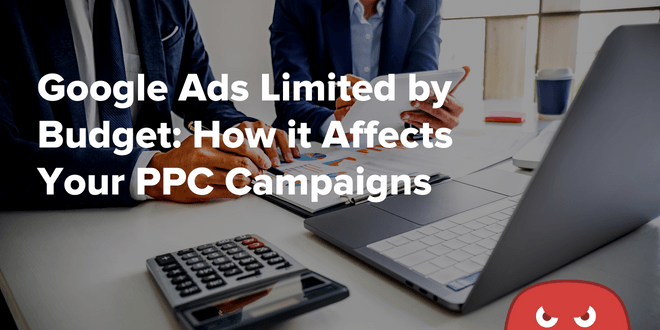

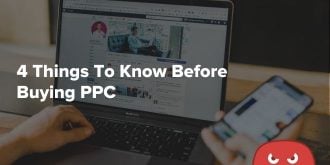

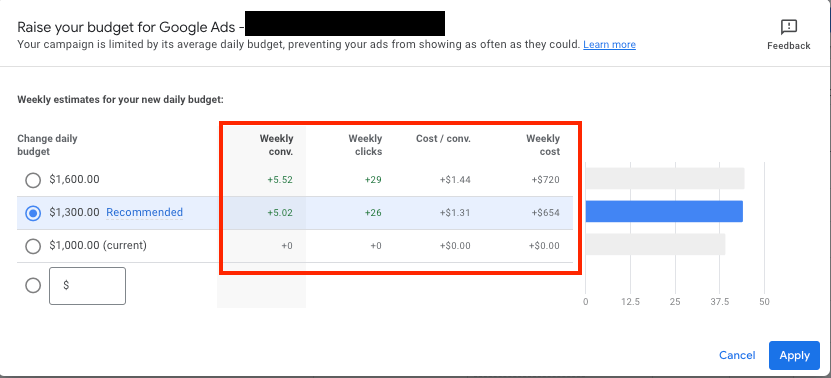
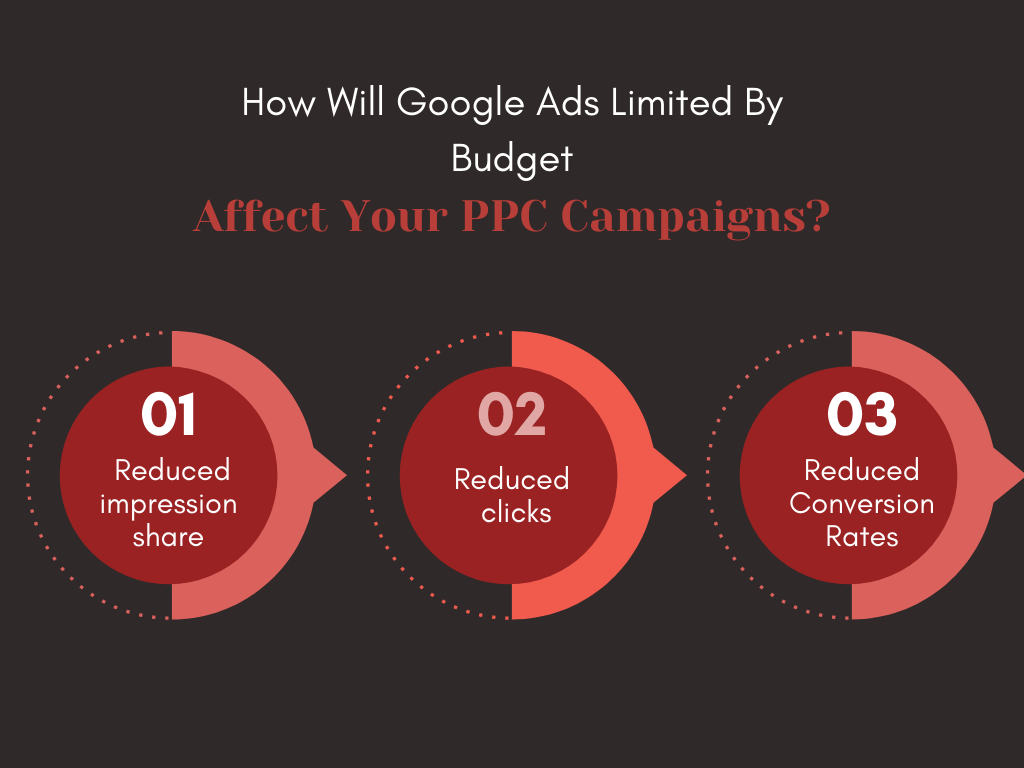
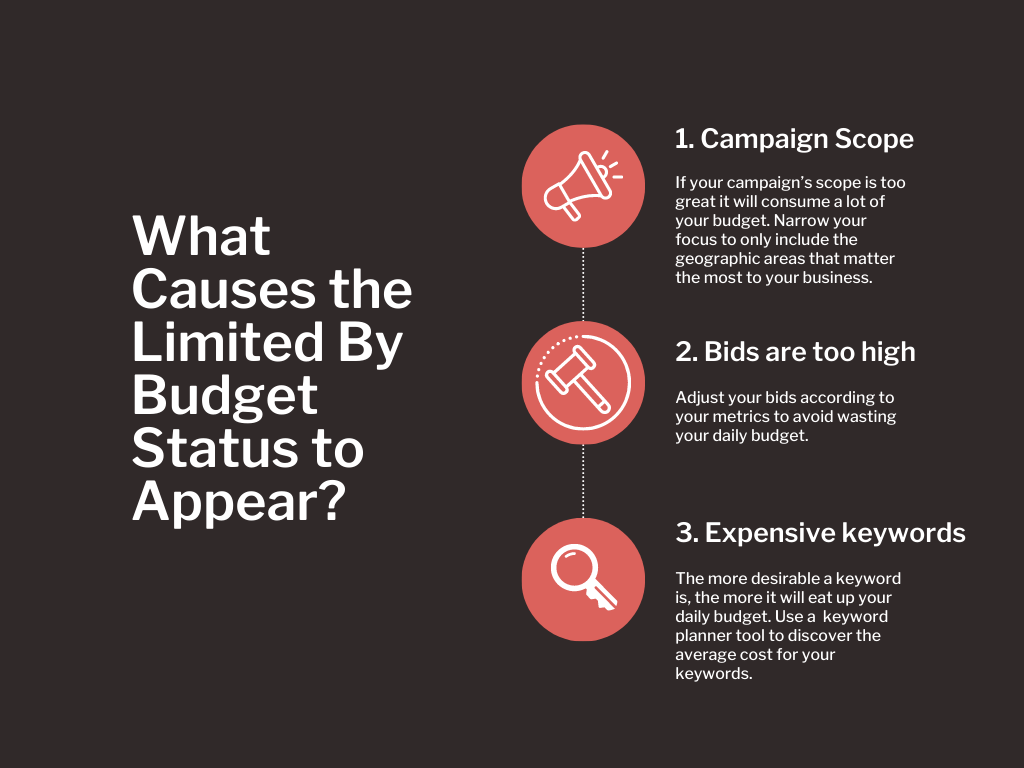
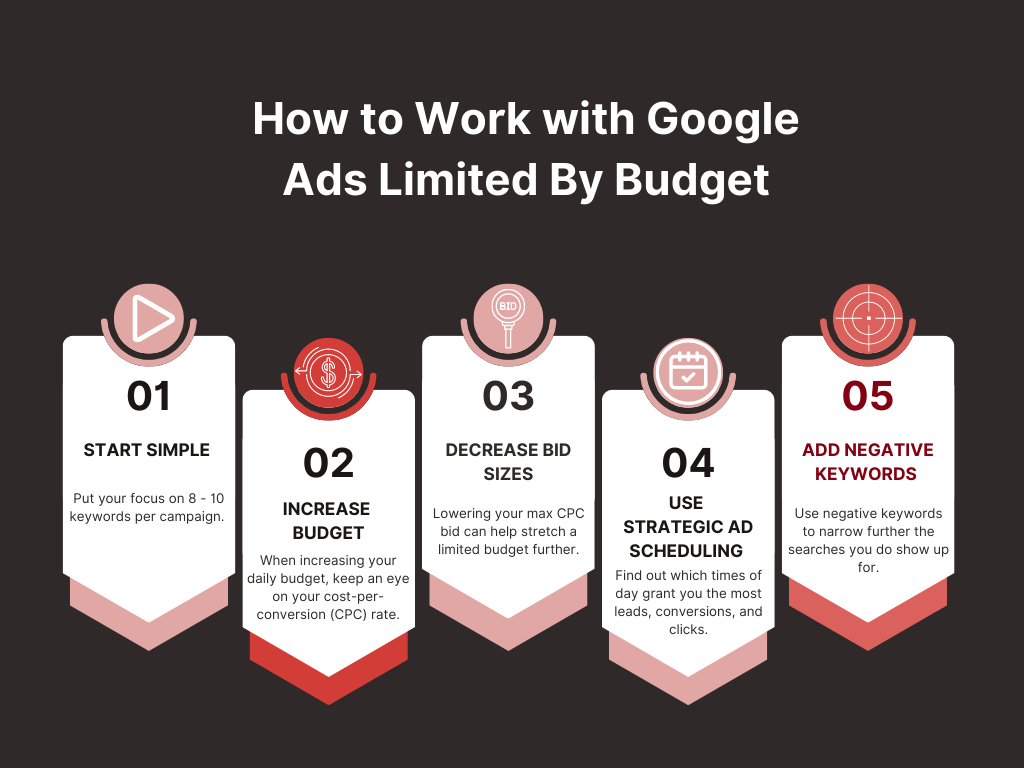


nice blog
Google Ads is a powerful platform that can help businesses reach their target audience and drive conversions. However, one factor that can have a significant impact on the success of a PPC campaign is budget limitations. When Google Ads is limited by budget, it can affect the reach and effectiveness of the campaign, and ultimately impact the ROI.
It’s important for businesses to understand the impact of budget limitations on their PPC campaigns and to take steps to optimize their campaigns accordingly. For instance, by carefully selecting keywords and adjusting bids, businesses can maximize the impact of their budget and ensure that they’re getting the most out of their PPC campaigns.
I find that if clients don’t have additional budget to add, I reduce the target CPAs with the goal that Google will work harder with the budget that we already have.